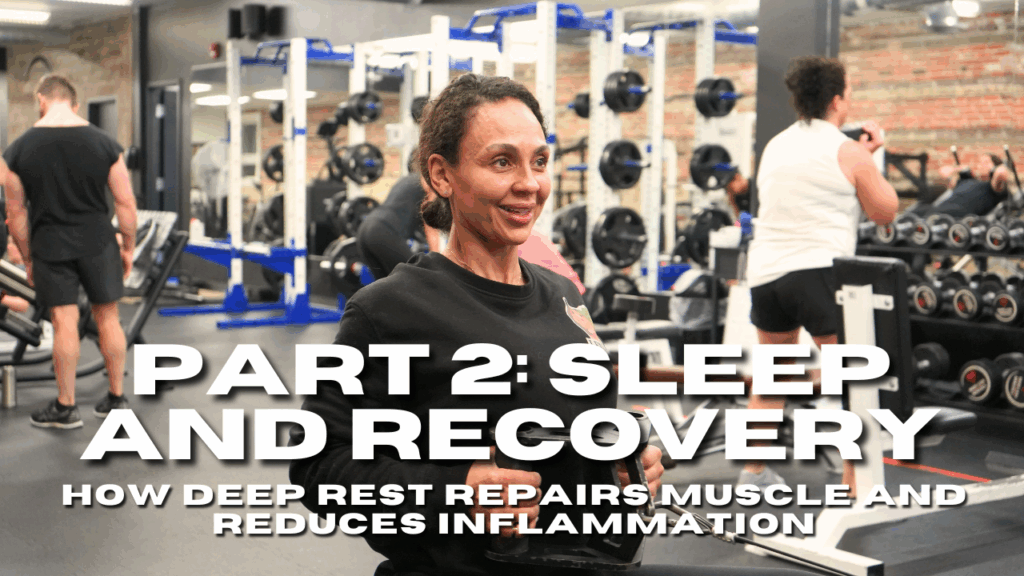
Lifting breaks your muscles down — sleep builds them back stronger. While training provides the stimulus, recovery is where progress happens, and high-quality sleep is the most powerful recovery tool at your disposal.
Microtrauma, Macro Gains
Resistance training causes microscopic damage to muscle fibers — a process known as muscle microtrauma. This damage is essential for muscle growth, triggering satellite cell activation and protein synthesis to rebuild and reinforce the tissue. But this repair process depends heavily on deep sleep.
During deep (slow-wave) sleep, blood flow to muscles increases, and tissue-repairing processes accelerate. Proteins that rebuild muscle tissue — like myosin and actin — are synthesized more effectively during this stage.
According to Dattilo et al. (2011), sleep deprivation can reduce muscle protein synthesis, delay glycogen replenishment, and increase markers of muscle damage, all of which impair recovery.
Inflammation: Friend or Foe?
Inflammation gets a bad rap, but some inflammation is necessary after training — it signals the body to begin the healing process. However, chronic or excessive inflammation (the kind that comes from overtraining and undersleeping) can blunt recovery and increase injury risk.
Insufficient sleep is linked to elevated levels of pro-inflammatory cytokines, including interleukin-6 (IL-6) and tumor necrosis factor-alpha (TNF-α) (Haack et al., 2007). These molecules can keep the body in a state of chronic low-grade inflammation, which:
- Delays muscle repair
- Increases soreness and fatigue
- Reduces neuromuscular performance
Glycogen Replenishment and Sleep
Muscles store glycogen for energy, and after a tough training session, those stores are depleted. Deep sleep enhances insulin sensitivity, helping muscles restore glycogen more efficiently. Poor sleep reduces this sensitivity, leaving your muscles partially fueled the next day — a major performance hit, especially for strength and high-volume sessions.
Recovery Isn’t Optional
Let’s get real: you can’t “out-grind” poor recovery. If you’re not sleeping enough, you’re not recovering enough. This increases the likelihood of:
- Overtraining syndrome
- Persistent fatigue
- Plateaued or regressed strength gains
What the Research Says
In a review published in Sports Medicine, Fullagar et al. (2015) emphasized the role of sleep in muscle recovery, noting that inadequate sleep impairs reaction time, decision-making, sprint performance, and recovery markers in athletes. While many studies focus on elite populations, general exercisers benefit from sleep in the exact same way — muscle damage is muscle damage, no matter your training level.
Another study by Haack et al. (2007) found that even partial sleep restriction increased IL-6 levels, suggesting that chronic short sleep duration could lead to a sustained inflammatory response.
Practical Recovery Tips
- Prioritize sleep on training days: Treat it like part of your workout plan.
- Post-training nutrition matters — but sleep is what locks in the gains.
- If you train late, wind down with low light, calming music, or light stretching.
Takeaways for White Lion Strong Members
- Sleep is when the real muscle-building happens — respect it.
- Poor sleep means poor protein synthesis, reduced recovery, and more soreness.
- Inflammation is normal — chronic inflammation from poor sleep is not.
References
Dattilo, M., Antunes, H. K. M., Medeiros, A., Mônico-Neto, M., Souza, H. S., Tufik, S., & de Mello, M. T. (2011). Sleep and muscle recovery: Endocrinological and molecular basis for a new and promising hypothesis. Medical Hypotheses, 77(2), 220–222. https://doi.org/10.1016/j.mehy.2011.04.017
Haack, M., Sanchez, E., & Mullington, J. M. (2007). Elevated inflammatory markers in response to prolonged sleep restriction are associated with increased pain experience in healthy volunteers. Sleep, 30(9), 1145–1152. https://doi.org/10.1093/sleep/30.9.1145
Fullagar, H. H. K., Skorski, S., Duffield, R., Julian, R., & Meyer, T. (2015). Sleep and athletic performance: The effects of sleep loss on exercise performance, and physiological and cognitive responses to exercise. Sports Medicine, 45(2), 161–186. https://doi.org/10.1007/s40279-014-0260-0